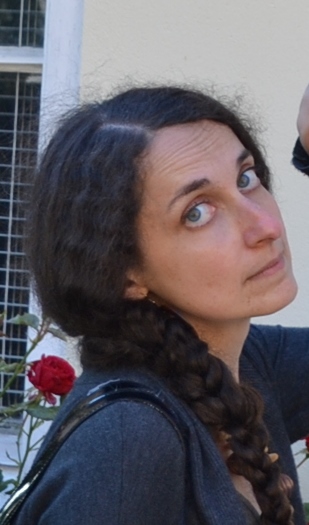 The first time Elina Gertsman stepped into a classroom as a teaching fellow in graduate school, she was terrified. But that feeling was soon replaced with another.
The first time Elina Gertsman stepped into a classroom as a teaching fellow in graduate school, she was terrified. But that feeling was soon replaced with another.
“At the end of that session, I was elated,” she said. “Who knew I would love teaching so much?”
Gertsman, who had been an art critic in Estonia before coming to the United States in 1994, had never even considered becoming a teacher. But after that positive experience, she decided to pursue a career teaching at a university.
Since her first time in front of a classroom, Gertsman, associate professor in the Department of Art History and Art, has excelled as an educator. She has been nominated for the Carl F. Wittke Award for Excellence in Undergraduate Teaching and Diekhoff awards several times, and was delighted to learn she won a 2015 John S. Diekhoff Award for Graduate Teaching.
“In a way, [the award] serves as an external confirmation for an internal conviction that teaching is my calling,” she said. “I feel, though, that it is my grad students who should be rewarded. Really, it is my excellent students who make my teaching everything it should be, and more.”
In nominating Gertsman for the award, one student cited her passion for art, command of a classroom and ability to help her students excel.
“I consider Professor Gertsman to be one of the best teachers I have encountered because she challenges and pushes her students forward so that they do not settle for mediocrity, but strive for something better,” the student nominator wrote. “As a result, her students are able to set and meet greater goals and higher standards than they previously expected of themselves.”
Gertsman prides herself on inspiring “academic courage” in her students. As part of a current seminar she’s teaching, students must submit weekly reading critiques. Recently, one student took on the task of critiquing one of Gertsman’s articles.
“[The student] expertly ripped it to shreds. It was wonderful, I loved it,” she said. “It tells me not only that the students learn to take apart scholarly literature, but also that they are not afraid to use their critical acumen on their professors’ work, which is as it should be.”
Passionate discussions are a hallmark of Gertsman’s teaching style. As a medieval art scholar, Gertsman calls on the history of medieval universities and their culture of public debate in her classroom.
“Well, I yell a lot. Medieval art is fantastic, strange, moving, disturbing. I want my students to love it as much as I do,” she said. “So, yes, I yell. I challenge. I demand. I have extremely high expectations.”
But Gertsman’s teaching style extends beyond the structure of her classroom. The irresistible passion she exudes for the subject matter in her classes is a hallmark of her teaching style.
“Not only is Professor Gertsman a brilliant mind in her field of study, she is also personally passionate about it, and has the ability to bring it to life for her students so that they are constantly engaged with her and the material,” the student nominator wrote. “I admire her because she is able to communicate her infectious enthusiasm in addition to her knowledge of the subjects she is teaching.”
While Gertsman said the Diekhoff Award is an honor, she considers her students’ successes as her favorite career moments.
“Any time my students’ papers get accepted to conferences, or their articles are accepted for publication, or they win grants, or they get internships,” she said, “these are the most gratifying moments because I feel utterly proud of them.”
The university created the Diekhoff Award in 1978 to recognize full-time faculty members who make exemplary contributions to the education and development of graduate students at Case Western Reserve University. The award was created in honor of John Diekhoff, who served at the university from 1956 to 1970 in roles such as professor of English, chair of the Department of English, dean of Cleveland College, acting dean of the School of Graduate Studies and vice provost of the university.
Initially, the award recognized two faculty members who excelled in teaching; in 2009, the School of Graduate Studies expanded the award to honor faculty members with strong graduate mentoring skills.

